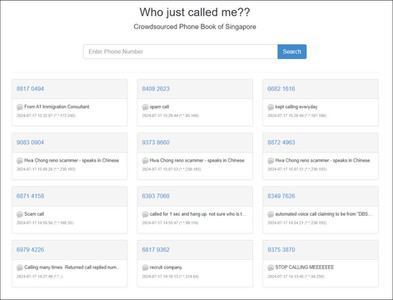Crowdsourced Phone Books of Singapore for Spam and Scam Calls
- circular connection
- Jul 17, 2024
- 2 min read
In the digital age, spam and scam calls have become a persistent nuisance for many Singaporeans. Despite efforts by the authorities to mitigate these unwanted calls, they continue to plague mobile users daily.

Image: iStock
Two valuable resources, WhosNumber and Who Called SG, provide a crowdsourced solution to help individuals identify unknown callers and decide whether to call back or block them permanently.
The Do Not Call (DNC) Registry

Screengrab: Personal Data Protection Commission
Singapore’s Do Not Call (DNC) Registry was established to protect residents from unsolicited marketing calls. Managed by the Personal Data Protection Commission (PDPC), this registry allows individuals to opt-out of marketing communications from businesses. However, the DNC Registry has its limitations. It does not cover scam or fraud calls, and enforcement can be difficult, particularly with calls originating from overseas.
Prevalence of Spam and Scam Calls

Image: CPPR
Despite the DNC Registry and other measures by Singaporean authorities, spam and scam calls remain widespread. Scammers continuously develop new tactics to evade detection, including number spoofing to disguise their true identities. These calls can range from aggressive marketing and phishing attempts to complex fraud schemes designed to steal personal information or money.
Crowdsourced Solutions:
Screengrab: WhosNumber, Who Called SG
WhosNumber: WhosNumber is a crowdsourced phone book where users report and review phone numbers. By searching a number on WhosNumber, individuals can see if others have identified it as spam, a scam, or a legitimate call. This information helps users make informed decisions about answering or blocking the call.
Who Called SG: Similar to WhosNumber, Who Called SG allows users to share their experiences with unknown callers. This platform provides a database of user-reported numbers, offering insights into the nature of the calls. Users can check these reports to decide whether to ignore or block the caller.
Benefits of Crowdsourced Phone Books:
Identification: These platforms help users identify unknown callers by leveraging the collective knowledge of the community.
Informed Decisions: By reading reviews and reports, users can decide whether to answer or block a number.
Community Contribution: Users can contribute their experiences, helping to protect others from spam and scam calls.
Effectiveness and Limitations

Image: Adobe
While WhosNumber and Who Called SG are effective tools, their accuracy depends on user contributions. There may be delays in identifying new scam numbers, and the platforms rely on the community to keep the databases up-to-date. Additionally, as scammers continually evolve their methods, staying ahead of them is an ongoing challenge.

Image: Shutterstock
Despite the presence of the DNC Registry and ongoing efforts by Singaporean authorities to combat spam and scam calls, these intrusions remain a common problem. Crowdsourced phone books like WhosNumber and Who Called SG offer practical, community-driven solutions to identify and block unwanted callers.
By using these platforms, Singaporean residents can make informed decisions about handling unknown calls and contribute to a collective effort to reduce the impact of spam and scam calls.










